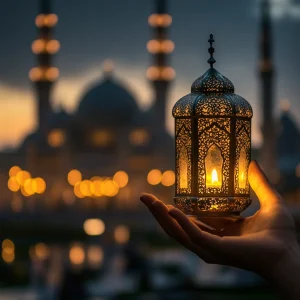Eco-Friendly and Sustainable Practices in Ramadan
Eco-Friendly and Sustainability Practices in Ramadan. Muslims consider Ramadan the holiest month that contains religious obligations of fasting together with prayer and mindful thinking. The main goal of Ramadan touches religion but simultaneously enables individuals to investigate their environmental interactions. During Ramadan, we can create environmental good through sustainability practices because the world confronts problems like climate change along with deforestation and pollution.
This article studies the practices of eco-friendly Ramadan events together with small alterations that support sustainable development in this holy month. Many environmentally conscious measures exist that allow you to fulfill spiritual obligations and environmental responsibilities throughout the sacred month of Ramadan.
Reducing Food Waste During Ramadan

Food consumption creates the largest environmental waste problem throughout Ramadan. The daytime and nighttime fast rituals (Suhoor and Iftar) consume tremendous food quantities, resulting in substantial waste. During Ramadan, the quantity of discarded food climbs because families create lavish spreads for sharing with visitors, although they mistakenly predict their food requirements.
Muslims who wish to reduce food waste and practice sustainability should follow several practical methods.
Plan and Portion Meals
Careful meal planning should replace the practice of preparing large food quantities. Family members receive the right portions through proper portioning, which decreases unwanted leftovers along with the need for additional food quantities. Reducing food waste occurs because this strategy prevents people from discarding their unwanted food products.
Use Leftovers Creatively
Careful handling of stored and recycled food reduces waste quantities substantially.
Donate Surplus Food
Donating excess food supplies to local food banks or charities should be your main option if you are no longer able to use that food. The charitable organizations both collect meals from food donors and deliver those meals to needy recipients, thus saving food from wastage.
Food waste reduction enables you to reduce your environmental impact and observe the Islamic teaching to share resources with needy people. Through Islamic teachings, generosity is supported, so making sure food goes to good use establishes an effective action of charity.
Eco-Friendly Iftar Gatherings and Packaging

Throughout Ramadan, families and communities assemble for Iftar to end their daily fast rituals with one another. The traditional get-togethers during Ramadan normally require numerous plastic items for serving food, including disposable dishes and flatware. Such items generate environmental harm when they wind up polluting the environment instead of making it to proper recycling facilities.
Hospitality during the Iftar occasion will become environmentally friendly when you adopt these sustainable alternatives:
Use Reusable Tableware
Consumers have a responsibility to utilize recyclable materials Plates, cups, and knives instead of plastic materials. Year after year, bamboo, stainless steel, and glass, together with bamboo, serve as fantastic perennial materials for substitution. Single-use plastic materials are reduced drastically as they are no longer disposed of in landfills or oceans through this method.
Reduce Packaging Waste
Sustainable shoppers should select food items that arrive with limited packaging when buying Iftar supplies. You should purchase your supplies in bulk format whenever it is feasible, together with products that feature sustainable packaging materials. Home-prepared foods are better than store-bought foods since you can determine the contents and packaging.
Compost Food Scraps
You can easily cut down on waste by composting organic materials such as vegetable peelings as well as coffee residue and fruit skin. Making organic waste into compost enables people to redirect essential earth nutrients from waste to productive earth use. You can achieve the best possible value from natural resources by using this practice.
Observing environmentally conscious behaviours at Iftar services enables you to both support Muslim community gatherings and decrease wastefulness. Using alternative items coupled with minimal packaging choices will accumulate substantial environmental improvements.
Mindful Water Usage During Fasting

The practice of water conservation represents a fundamental sustainability principle that people must practice during Ramadan. Muslims must refrain from food and drink consumption throughout daily fasting hours, starting from dawn until sunset, which results in increased awareness about water usage. Water consumption goes easily unnoticed during the everyday kitchen preparation process as well as dishwashing and both Suhoor and Iftar times.
These tips outline methods to save water during the Islamic observance of Ramadan.
Use Water Wisely
Large water consumption is common during Suhoor and Iftar because fasting leads people to drink after one day of abstaining from food and drink. The need for hydration requires attention, but it needs to be balanced against water consumption levels. You should measure your required water amount instead of letting faucets run and cooking with abundant water so you minimize wastage.
Fix Leaks and Drips
The continuous leakage of water from pipes and dripping faucets leads to major water waste accumulation during specific time periods. You should inspect and fix all leakages throughout your residence before the start of Ramadan. Fixing taps properly along with washer replacement helps avoid water waste.
Collect Water for Cleaning
You should gather water in a basin when cleaning or washing dishes by using the collected water instead of leaving the tap running continuously. Controlling water usage becomes possible through this method.
Staying alert about water use in Ramadan brings dual benefits through resource conservation and following Islamic teachings of moderation. Through his teachings, the Prophet Muhammad (PBUH) informed his followers to refrain from wasting any amount of water, including abundant resources. Through Sunan Ibn Majah, a narration reveals the Prophet stating:
You must conserve water when performing the ablution process even though you stand near an overflowing river.
Eco-Friendly Ramadan Decorations

Celebrations during Ramadan bring joy to Muslims through decorative elements, which include lighting some areas. Many festive items at Ramadan celebrations, such as plastic banners and balloons together with disposable lanterns, generate unnecessary waste while creating environmental pollution. For developing an environment-friendly home, you should consider these sustainable decoration options:
Use Natural Materials
The use of decorations crafted from natural wood as well as fabric or paper will create a welcoming ambiance that protects environmental health. Homemade fabric garlands along with paper lanterns hold up for multiple years, which reduces the amount of waste created by decorations.
Energy-Efficient Lighting
Light decorations should use LED bulbs instead of standard incandescent bulb illumination for more sustainable decorating. LED lights minimize energy usage and endure longer periods while also decreasing both waste and electric expenditure.
Reuse Last Year’s Decorations
You should reorganize your existing decorations for annual use instead of making new decoration purchases. Prioritize unbreakable decorations of high quality when purchasing new items because they will retain their value to be reused again in future Ramadan celebrations.
The use of environmentally friendly decorations delivers both ecologically beneficial outcomes and preservation of the Ramadan event spirit.
FAQs For Eco-Friendly and Sustainable Practices in Ramadan
Conclusion
During Ramadan, Muslims use the spiritual alignment period to implement sustainable routines for their everyday activities. The environmental preservation efforts of Muslims become stronger through their actions to minimize food waste alongside their choice of environmentally friendly decorations and water preservation and the utilization of reusable items at their Iftar events.
Sustainability initiatives incorporated during Ramadan help Muslims serve both their faith and their environment. Making purposeful choices throughout Ramadan enables us to achieve spiritual betterment while building environmental consciousness, which becomes a period of meaningful action. The spiritual principles of Islamic ideology show themselves through both moderate behaviour and generous giving to the world’s environment.





